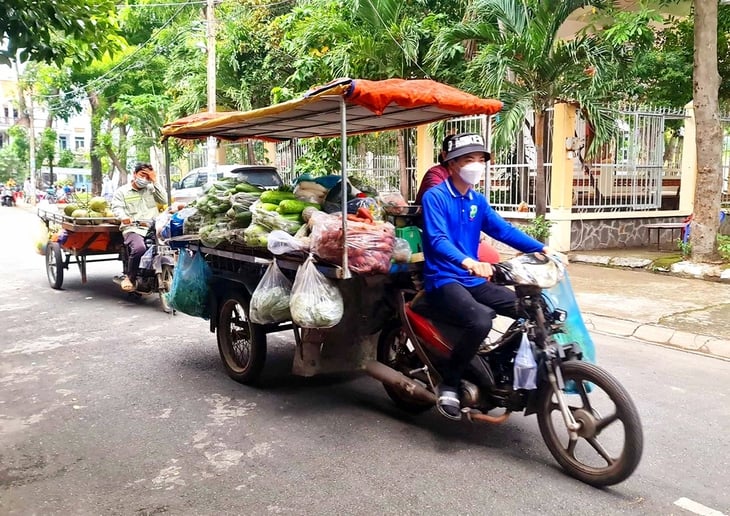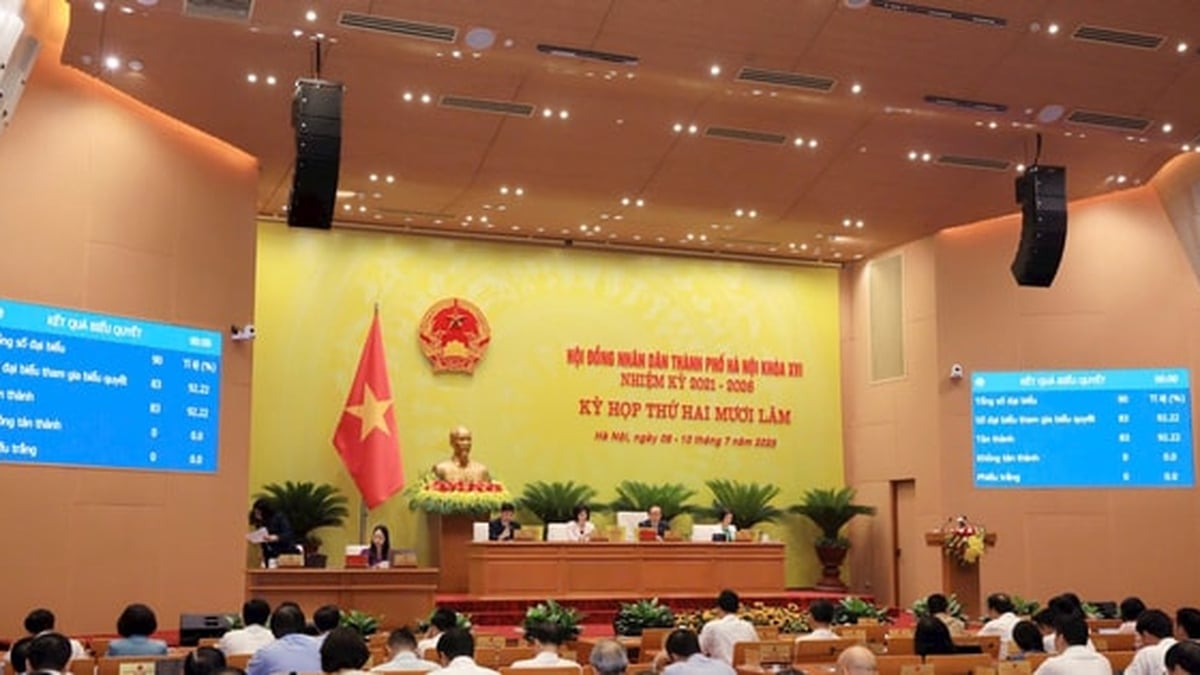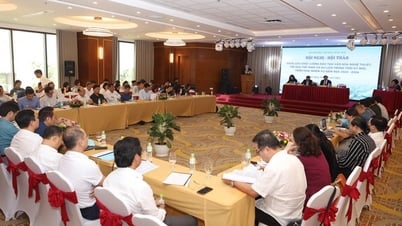
People shopping at a shopping mall in Ho Chi Minh City - Photo: TU TRUNG
Accordingly, salaried employees can deduct reasonable expenses based on actual living expenses instead of rigidly applying a deduction level as is currently the case.
Amending the Personal Income Tax Law: Family deductions must also be innovated
In Resolution No. 191 dated June 26, the Government assigned the Ministry of Finance to study and adjust the family deduction level based on the assessment of criteria and factors affecting taxpayers' income in current socio-economic conditions, taking into account differences between regions and areas.
This is a very new requirement stemming from the fact that recently many taxpayers believe that the current VAT rate is too outdated and does not keep up with the reality of life, causing salaried workers in big cities to "tighten their belts". The current deduction for dependents is also not enough to support children in public schools.
Ms. Kim Loan (Go Vap, Ho Chi Minh City) said that she has two children studying in primary and secondary school at a public integrated school, the monthly school fees for her two children are on average 10 million VND/month including boarding fees and integrated tuition fees. That does not include the tuition fees for extra math and English at the center, which is about 5 million VND/month for both children.
"So roughly, every month, just tuition alone costs 15 million VND, not to mention uniforms, books... at the beginning of the year, food and a series of other expenses, but every month I only get a family deduction of 8.8 million VND/month for my two children. That is too unreasonable.
I suggest that in this revision of the Personal Income Tax Law, the tax sector should research and come up with a reasonable policy, allowing salaried employees to deduct reasonable and valid expenses for their living expenses instead of fixing a fixed amount as it is now regardless of the region or city the taxpayer lives in," Ms. Loan suggested.
Meanwhile, Ms. Minh Tu (District 7, Ho Chi Minh City) said that in the current context, salaried workers in big cities have to bear a lot of expenses - in addition to monthly living expenses and childcare, many people also have to pay interest on home loans..., the interest is quite large but this amount is not deductible. "That is unreasonable because later if I sell my house, I will also have to pay a 2% tax on the transfer price," Ms. Tu said.
Mr. Nguyen Duc Nghia, deputy director of the Center for Supporting Small and Medium Enterprises under the Ho Chi Minh City Business Association, said that recently, revenue from salaried employees has accounted for a very large proportion of the total revenue from personal income tax. However, other groups such as e-commerce, online trading... have not.
Therefore, tax authorities should also have policies to encourage salaried workers by allowing deductions for reasonable expenses such as bank loan interest for buying the first house, purchasing means of transport, medical treatment, education, etc.
"This is a legitimate deduction that helps salaried workers ease their burden in life and is meaningful for social security. At the same time, it is necessary to exploit additional revenue sources from areas that have lost revenue in the past to compensate," Mr. Nghia suggested.
All reasonable expenses for the employee's life should be deducted from the invoice.
Tax expert Nguyen Thai Son said he supports the proposal to study and adjust the VAT rate based on the assessment of criteria and factors affecting taxpayers' income in current socio -economic conditions, taking into account differences between regions and areas. This is also something that taxpayers have repeatedly requested.
In addition, 1-6 business households with revenue of over 1 billion VND/year in the prescribed industries must apply electronic invoices generated from cash registers connected to transfer electronic data to tax authorities.
According to the roadmap from 2026, the tax on business households will be abolished. At the same time, businesses with invoices of 5 million VND or more must transfer money to be included in the valid reasonable expenses (instead of the current level of 20 million VND).
Thus, all revenue of households and businesses must be transparent, sales must have invoices and documents. This is a ripe condition to apply deductions according to people's actual living conditions.
According to Mr. Son, the tax authority should accept the deduction of all reasonable expenses serving the workers' lives according to the invoice - including living expenses, advanced study expenses and loan interest expenses.
Previously, when the Personal Income Tax Law was developed in 2007-2008, there was such a proposal, but at that time, society mainly paid in cash and buyers did not need to get invoices, and there were no regulations on electronic invoices being created from cash registers connected to transfer electronic data to tax authorities, so it could not be applied in this way; at that time, the tax authority proposed a fixed VAT rate as is currently applied.
After 17 years of application, the current GTGC method has revealed many shortcomings and cannot keep up with the reality of workers' lives, so taxpayers and experts have made many recommendations.
"In the current situation, in my opinion, the tax authority needs to boldly apply new methods because when applying deductions based on reality, it will automatically differentiate regions. In big cities, the cost of living will of course be higher, so the deduction level will also be higher," Mr. Son commented.
According to Mr. Son, with this deduction method, the tax authority gains more than it loses because applying deductions based on actual living conditions also stimulates consumption development, increases the circulation of goods, releases inventory, thereby the State collects from corporate income tax and VAT. Therefore, we should not worry too much about budget deficit because the tax authority can exploit revenue sources from other areas, especially e-commerce, online business...
Meanwhile, Mr. Nguyen Van Duoc, General Director of Trong Tin Accounting and Tax Consulting Company, proposed to build a GTGC level that is close to the current reality so that when the CPI only needs to increase by 5-10%, it can be adjusted promptly instead of having to wait for a full increase of 20% as it is now.
How are regional income and expenditures different?

The cost of living today has significant regional differences - Photo: MANH DUNG
The results of the 2024 population living standards survey, conducted by the General Statistics Office (Ministry of Finance) nationwide, recorded from 46,995 representative households in 6 socio-economic regions, showed that in 2024, the average income of people continued to improve and increase in both urban and rural areas. People's spending also increased again, especially in urban areas, after decreasing due to the COVID-19 pandemic.
In particular, the Southeast region has the highest average income with nearly 7.1 million VND/month - nearly 1.9 times higher than the lowest region, the Northern Midlands and Mountains (nearly 3.8 million VND/month).
The remaining regions have the following average income per capita/month: Red River Delta reaches 6.558 million VND/month, North Central and Central Coast reaches 4.648 million VND/month, Central Highlands reaches 3.882 million VND/month, Mekong River Delta reaches 4.753 million VND/month.
Also according to the General Statistics Office, with the average monthly income per capita in 2024, only 20% of the highest-income group in the country, with an income of about 11,812 million VND/month, will be subject to personal income tax.
In Hanoi , the 20% of the population in the highest income group has an average income per capita of 13,543 million VND/month, in Ho Chi Minh City it is 14,510 million VND/month, in Da Nang it is 14,830 million VND/month...
However, the survey also showed that the total average spending per capita/month reached nearly 3 million VND, an increase of 6.5% compared to 2022, of which the urban area was nearly 3.8 million VND - an increase of 15.4%, showing that the difference in pressure on living costs by region and urban - rural areas is very clear.
Source: https://tuoitre.vn/giam-tru-gia-canh-theo-muc-chi-tieu-thuc-te-tai-sao-khong-20250703220734392.htm

























![[Photo] Gia Lai provincial leaders offer flowers at Uncle Ho's Monument with the ethnic groups of the Central Highlands](https://vphoto.vietnam.vn/thumb/1200x675/vietnam/resource/IMAGE/2025/7/9/196438801da24b3cb6158d0501984818)












































































Comment (0)